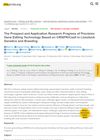 June 2024 in “International Journal of Nanomedicine”
June 2024 in “International Journal of Nanomedicine” CRISPR/Cas9 has improved precision and control but still faces clinical challenges.
 13 citations
,
March 2020 in “Genes”
13 citations
,
March 2020 in “Genes” Disrupting the FGF5 gene in rabbits leads to longer hair by extending the hair growth phase.
 51 citations
,
June 2021 in “Signal Transduction and Targeted Therapy”
51 citations
,
June 2021 in “Signal Transduction and Targeted Therapy” The document concludes that while there are promising methods to control CRISPR/Cas9 gene editing, more research is needed to overcome challenges related to safety and effectiveness for clinical use.
 10 citations
,
May 2019 in “Seminars in Cell & Developmental Biology”
10 citations
,
May 2019 in “Seminars in Cell & Developmental Biology” Understanding and manipulating epigenetic changes can potentially lead to human organ regeneration therapies, but more research is needed to improve these methods and minimize risks.

CRISPR/Cas9 gene-editing shows promise for livestock breeding but faces challenges like low efficiency and off-target effects.





